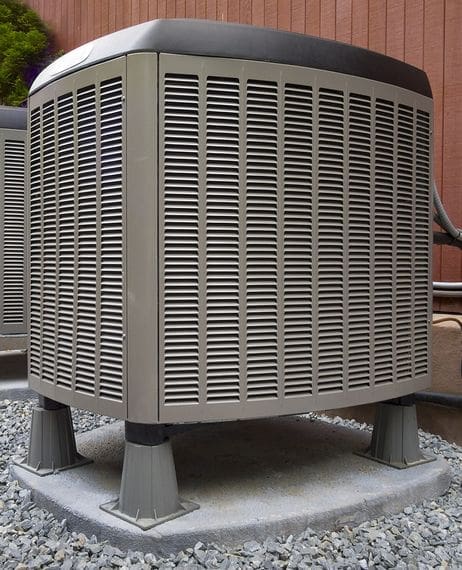

A heat pump and a furnace are not the same thing. The furnace uses energy to create heat, a heat pump uses (much less) energy to move heat. Even the name “heat pump” may be slightly misleading, since it is both a heating and cooling system.
Although the concept has been around for centuries, the modern heat pump was invented in the late 1940s by American inventor Robert C. Webber. Because the physics behind heat pump technology is more about energy exchange than consumption, it is a more efficient way to heat and cool space.
While one type of heat pump (air-source) is by far the most commonly installed, there are different types of heat pumps which use different types of technology.
Air-source heat pumps
An air-source heat pump is aptly named – it uses air. It works by transferring heat in the air out to produce cooler temperatures, or transferring heat in to produce warmer temperatures. Because they move heat instead of generating it, the demand for electricity is approximately half that used by conventional furnace and baseboard heaters.
Heat pumps have been around for several years and available in most parts of the U.S., although not widely used in areas that have extended periods of very cold weather. New technology in recent times is making them more effective in colder areas as well.
Ductless mini-split heat pumps
For older buildings which used radiator heat or space heating, a ductless, mini-split heat pump can be retrofitted to provide heat pump efficiency. They have a small outdoor compressor/condenser connected by a conduit to as many as four indoor air-handling units – each with its own thermostat. Because there are no ducts, you avoid losing energy through the ductwork.
Mini-splits can be floor-standing, hung from a ceiling, or mounted flush from a wall – providing options for interior placement. It is important to install them correctly, however, because oversized or poorly located units can end up wasting energy and costing more. Installation costs can be higher than other systems, but then offset by lower energy costs. Check which of your local HVAC contractors have experience installing ductless mini-split heat pumps.
Geothermal heat pumps
The temperature may rise and fall dramatically above the earth where we live and breathe – but a few feet underground, the earth stays at a constant temperature (ranging from 45°F to 75°F, depending on where you live). So instead of using air, geothermal heat pumps use the constant temperature of the earth as their exchange medium – transferring heat between your house and the ground or a close water source.
These heat pumps are significantly more expensive to install, but they are significantly lower operating costs and do not depend on outside temperatures. Additionally, they can reduce energy consumption by as much as 60%, control humidity levels, and they require less maintenance over their expected life of 25 years (for inside components – 50+ years for the outside components).
Absorption heat pumps
A newer model is the absorption heat pump, sometimes called gas-fired heat pump. These systems are powered by natural gas, propane, solar energy, or geothermal-heated water instead of electricity. They work by way of an ammonia-water absorption cycle, absorbing heat from the interior of a room to provide cooling, and/or releasing heat into the interior to provide heating.
Generally, absorption heat pumps are used in commercial or industrial settings, but are available for some large (4,000 square feet+) residential homes. They are best utilized the most sense in areas which have no easy source of electricity.
Post Categories
Why Choose Us?
- We're strategically located in Pearland, TX
- Expertise to service all of your HVAC equipment
- Our technicians are NATE-certified
- We are an ACCA member company
- BBB accredited south Texas HVAC business
- We stand behind all of our HVAC work
